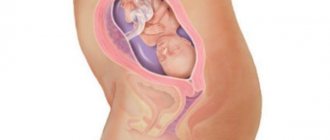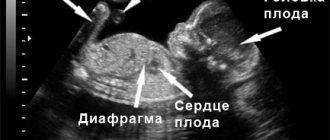Movement during this period of pregnancy
20 weeks is already halfway through pregnancy, during which many changes have already occurred in both the expectant mother and the developing baby. Already now you can feel the baby’s movements, they look like light tremors, some compare them to the “fluttering of butterflies” inside the stomach. Women begin to feel the baby differently: some at 16-17 weeks, and others at 21-22. This difference is obtained due to the woman’s body weight and fetal activity. Thinner people begin to feel movements earlier than plumper ones. When the baby moves, it gives the mother the most wonderful sensations, her mood improves, and the pregnancy itself is unforgettable. Positive emotions produce the hormone of joy, because only thanks to them such troubles as oligohydramnios, placenta previa or toxicosis in the 3rd trimester are put aside.
20 weeks pregnant, no movements? There is no need to be upset, because at this stage they are observed infrequently or may disappear for some time, and this is considered the norm for the course of pregnancy; such behavior of the baby should not be a cause for concern. However, you need to be vigilant; if there is no movement for a long time, immediately contact your obstetrician-gynecologist, otherwise it may end in a miscarriage. At this time, an artificial birth can be performed if specialists discover any pathologies in the development of the fetus. This is done in order to prevent the birth of a non-viable baby and eliminate risks to the mother’s life during pregnancy and subsequent childbirth.
The expectant mother should know that within 30 minutes her baby should make 20-60 movements. The strength, rhythm, and tempo of movements depend on the time of day: movements are more active at night and in the evening, and the rest period occurs approximately in the morning hours. Boys are considered more active than girls.
10 episodes (that is, you felt the baby move, and then he began to push and roll over - this is considered one episode) per day is considered the norm for the baby to move. The absence of 10 movements a day indicates hypoxia (oxygen deficiency), for its treatment it is necessary to consult a specialist. Persistent and strong movements indicate an uncomfortable position for the mother. If the fetal movements become painful, restless, more active than before, this may indicate the initial stage of oxygen deficiency; with progressive hypoxia, movements are weakened or stop altogether.
It must be remembered that the baby can move during loud noises, when eating, lack of fresh air, and most often at night. The child already hears everything clearly and can thus react to factors that irritate him.
First fetal movements
It is believed that a woman begins to feel the first movements of the child during her first pregnancy.
20 weeks
, for the second and subsequent pregnancies - from
18 weeks. However, these are average statistics; in reality, everything depends on the woman’s individual sensitivity and other factors. For example, slender women who lead an active lifestyle begin to feel the baby’s movements earlier.
additionally Thus, the first movements of the baby, felt by the mother, may appear in the period from 16 to 24 weeks of pregnancy.
The first movements of the fetus are usually very weak and rare. The sensations from the movements are quite difficult to describe: some compare them to “gurgling”; for others they resemble light stroking or tickling. Closer to 24 weeks, the movements become more distinct, more and more reminiscent of pushes, and they can be felt by people around them by placing their hand on the stomach.
The size of the fetus, its weight and the formation of the baby
At 20 weeks of pregnancy, the size of the fetus is already about 25 cm, and the weight is a little more than 300 g, the distance from the crown to the tailbone reaches 16 cm. The mother also begins to change significantly, the stomach begins to grow more noticeably, and this is not surprising, because half of the entire pregnancy has already passed. If a pathology is observed, then the child’s height and weight deviate significantly from the norm, fetal development with disturbances is noticed, and if the existing pathology cannot be cured by modern medicine, then artificial childbirth is recommended to the woman.
At 20 weeks of pregnancy, the size of the fetus begins to noticeably increase every day, the child’s internal organs are already formed and can already function independently. Marigolds have appeared, and you can see an individual pattern on the fingertips. Intensive weight gain and development of the baby is noticed, the size of the child increases every day of his life, the mother must eat properly to ensure the proper development of pregnancy. 20 weeks is the period at which the baby's skin thickens, but the face is still wrinkled. This can be seen during an ultrasound examination.
girls, what are the baby’s first movements like?
We are now 20 weeks, I felt the first movements at 16 weeks. I also told my husband that I felt like bubbles were bursting)) These are no longer bubbles, but something significant))) I told my doctor that I felt movements, so she was happy for me and was not surprised that it was so early. She said that this is normal)))) In general, now I constantly wait for these movements, especially the baby starts kicking right around 11 pm, when I’m already falling asleep))
Original message
ja_samaja:
We are now 20 weeks, I felt the first movements at 16 weeks.
I also told my husband that I felt like bubbles were bursting)) These are no longer bubbles, but something significant))) I told my doctor that I felt movements, so she was happy for me and was not surprised that it was so early. She said that this is normal)))) In general, now I constantly wait for these movements, especially the baby starts kicking right around 11 pm, when I’m already falling asleep)) Original message
Sunnyplus:
I felt as if a fish was swimming in such waves.
=) It was very nice! My doctor personally told me that this can happen as early as 12 weeks, but it’s different for everyone. I generally liked her (the doctor), although I went to a regular district residential complex.
I felt it at 17 weeks 5 days..
although the doctor told me that I couldn’t feel them either.
They became stronger, but not more painful. I like the way my baby moves))) It’s nice))))))))
The main thing is not to worry about what you don’t feel yet. I felt it somewhere around 19-20 weeks, and I kept thinking why, why, why can’t I feel the baby yet? This is absolutely normal. And the fact that you are describing bubbles or pulsation is most likely what they are! Congratulations, an unforgettable and incomparable experience.
Low placentation during this period of gestation
When the placenta (its lower edge) is located 5 cm below the internal os, then we encounter the phenomenon of low placentation. 20 weeks of pregnancy is the period at which doctors can diagnose a low-lying placenta. However, do not worry, the placenta can migrate up to 34 weeks; you just need to monitor this process using ultrasound at 16 weeks, 24-26 weeks and 34-36 weeks. The placenta is an organ that forms during pregnancy. It has a protective function, provides the child with oxygen, and through it the baby receives all the necessary nutrients.
Usually, during pregnancy, the placenta is attached to the anterior or posterior wall of the uterus, closer to its bottom. If the placenta is attached low, then this is considered a pathology - placenta previa, but low placentation is not yet presentation, since it is located low, but there is a gap between it and the exit from the uterus.
The causes of a low placenta may be associated with uterine fibroids, multiple pregnancies, underdevelopment of the uterus, the consequences of an abortion, or the occurrence of inflammatory diseases. This pathology can cause bleeding. If placentality is low, sudden movements should not be made; physical activity is contraindicated. Low placentality can affect the fetus, as it will not receive enough oxygen and nutrients.
20 weeks pregnant: your baby is moving
The development of pregnancy at 20 weeks is a special period, because it is exactly the middle of pregnancy. Now mom's baby bump has become noticeable and everyone is noticing how beautiful she looks. But, the most important thing is that it is at this time that the mother can feel her baby, because he begins to move more and more often.
Fetal development at 20 weeks of gestation
When pregnancy reaches 20 weeks, we can safely say that at this moment the baby is considered practically viable. All his organs are already quite capable of performing the functions that are assigned to them, because they have already been formed at this stage. Also, the child, although he is in his mother’s tummy, nevertheless, he hears perfectly, he has a sucking reflex and he already knows how to swallow. And the most important thing is that movements are felt at 20 weeks of pregnancy. For a mother, it is a great happiness to feel how the baby makes movements inside her. As for the endocrine system, it also performs its functions during this period.
The mother herself should feel quite normal during this period of her baby’s development. Now it shouldn’t be very difficult for her, because her tummy is not as big as it was at the end of pregnancy. In addition, the condition when a woman was overcome by toxicosis is no longer present at 20 weeks.
Fetal movements at 20 weeks of pregnancy
During the period when pregnancy has reached 20 weeks, a woman should feel active movements of her baby. Under no circumstances should a woman say that at 20 weeks I don’t feel any movement. If this is the case, then you need to sound the alarm. The child is now making such movements that it is impossible not to feel them. In addition, a mother can easily and simply count how many pushes her baby makes over a certain period of time.
Fetal movements at week 20 can be either restless or overly calm. Both conditions are also not normal. Therefore, you should constantly listen to how the baby moves, and if something happens, urgently contact a specialist. During this period, all movements of the baby should be moderate.
As a rule, every 10 minutes a woman should feel at least one movement of the baby. But it is worth noting that the child is not able to move around the clock. He can only make movements while he is awake. When the baby falls asleep, no movements will be felt.
It is worth noting that the baby moves more often at 20 weeks than before. This means that he has much more space to perform actions. It is during this period that you can notice more movements than before. But if the situation is different, and at 20 weeks the child does not move, then this indicates that not everything is all right with him. In addition, a day the baby can quite easily change its position in the uterus several times. Therefore, it is simply impossible to say that there are no movements at week 20, this is no longer normal.
The baby's kicks, when the mother feels them, can last up to several minutes. Such moments occur, as a rule, 10-15 times a day. Of course, the moment when the baby does not make any movements lasts much longer, because he sleeps most of the time, namely from 16 to 20 hours. It is not for nothing that sleep makes up the majority of the time, because it is in sleep that the formation, growth and development of the baby occurs.
Recognition of fetal movements
First of all, the 20th week of pregnancy is marked by the movements of the baby. However, the mother can feel the first movements of the fetus much earlier, starting from the seventh week. But during this period they are not as active as at 20 weeks, so not all mothers can recognize them. There is nothing terrible about this, it is much worse when no movements are felt at 20 weeks. Many are not able to feel the baby's movements before 20 weeks because the size of the fetus is still too small and it is not able to touch the walls of the uterus. But starting from the 20th week, the woman just needs to feel how the fetus moves at the 20th week.
In most cases, only those women who already have a child are able to feel movements before 20 weeks, since the walls of their uterus become much more sensitive after previous births. But starting from the 20th week, the baby moves often.
It is also worth noting that there are women who, despite the fact that their children are developing quite normally inside, say that the child does not move at 20 weeks. This may be the case for those mothers who have a very plump physique. Only such women find it difficult to determine whether to eat or not at 20 weeks of movement.
Activities necessary for fetal development
At 20 weeks, a woman should have a fairly good appetite. But you should know that you shouldn’t eat everything, you need to eat healthy food so that the child can receive only healthy components. This is important for the development of the baby, including in order to feel movements at 20 weeks of pregnancy.
To avoid a situation where no movements are felt at 20 weeks, you need to lead a healthy lifestyle. It is necessary to go outside as often as possible and take walks at a slow pace. A woman, although she is in a position, must move. She also needs fresh air. Therefore, if weather conditions permit, you should spend most of your time outside. This is what will contribute to the fact that the sensations of fetal movements at week 20 will become really noticeable, as they should be.
In addition, children often move at 20 weeks with mothers who talk to them, read books to them and let them listen to calm music. The child, while inside, is able to respond to the voice and sounds that he likes. By this he gives a sign that he hears everything and is very happy about it.
My pregnancy is 20 weeks + Ultrasound
If mothers lead an incorrect lifestyle and abuse bad habits, then they may well have a situation where at 20 weeks the children do not move. The fact that such mothers do not move at week 20 is due to the fact that it is difficult for the child to make movements, they develop more slowly, and the mother herself decreases sensitivity.
Proper development of the baby during pregnancy is the key to the baby being born strong and healthy.
At what period of pregnancy does active fetal movement begin?
At what period of pregnancy does active fetal movement begin?
When the baby in the tummy begins to move, it gives mommy joy and many new sensations. The expectant mother can feel the first tremors at 20 weeks of pregnancy, and if this is not the first child, then 2-3 weeks earlier. At first, these tremors are barely noticeable, they can be compared to the light flapping of a butterfly's wings or the bursting of bubbles.
When does the baby start to move?
By the 15th week, the child continues to grow rapidly, and he acquires more familiar human features. At this stage, the baby clasps his hands at the elbows and wrists, can clench his fists and even suck his finger. At week 16, the legs become longer than the arms, and the baby can move them. Typically, women feel the first movements (movements) of the fetus between 16 and 20 weeks of pregnancy, but this is individual for each person. As a rule, multiparous women feel fetal movements earlier. At week 17, the baby is still swimming freely in the amniotic fluid, his height is slightly more than 16 centimeters. For now, the baby does not move every day, but as the period increases, the tremors will be felt more often and stronger. At week 18, active fetal movement can be felt 4-8 times per hour.
Is there a norm for fetal movements in the second trimester?
When the pregnancy is up to 28 weeks, it is impossible to determine the well-being of the fetus or its state of health by the number of tremors that the mother can feel. Before this time, the child’s nervous system is not yet mature enough for movements to become regular. The mother's constant worry about the baby's health is not the best for the baby, because he reacts to the state of the mother's body. In the meantime, the expectant mother, for her part, can contribute to the healthy development of the little body if she eats regularly and properly, gets enough sleep, spends time in the fresh air more often and does not succumb to stress and depression.
What does the baby react to with his movements?
At 28–30 weeks, the baby usually behaves very actively. It can respond with movements in response to different types of stimuli. For example, when a sharp or loud sound occurs, the baby may respond with stronger and faster thrusts. When the baby lacks nutrients, he also moves more actively: this can happen if the mother moves quickly or lies in an uncomfortable position, as a result of which the large vessels of her body are compressed, and less blood flows to the placenta. Babies sense mother's anxiety and may move more actively if mother is nervous. If the mother feels that the baby has suddenly rebelled for no reason, this should be a sign to her that the baby is experiencing discomfort. To calm your child down, you can change your body position, move away from loud noises, or simply calm down, driving away disturbing thoughts. If the expectant mother is very concerned that the fetus has not moved for a long time, she can eat something high in calories or do light exercises - and then the baby should react.
Is there any cause for concern?
A reason for concern may be a disruption in the baby’s usual activity. Some children are active in the womb, and some are not, so there is no strict norm for fetal movements. But if the baby begins to behave in a manner unusual for himself, this is a reason to consult a doctor. For example, sudden and excessive fetal movement may be an indicator of hypoxia (lack of oxygen). Lethargy and a sudden decrease in the baby’s motor activity can also be the result of deep hypoxia, and in this condition the growth and development of the baby slows down. To prevent this from happening, the obstetrician will order additional examinations and prescribe treatment if necessary.
Observation diary
There are several methods for monitoring the behavior of the baby. It is useful to keep a diary where you can record the time and duration of your baby's wakefulness.
The baby has not yet been born, but he already has his own habits and a certain routine. The baby's periods of sleep are followed by periods of wakefulness, and his activity may also depend on his mood. According to experts, the child should make itself known at least 10 times a day, including when the mother is sleeping. You can count your baby's movements for 6 hours straight at a certain time of day every day. If you feel less than 5 tremors within 6 hours at least 2 days a week, this is a reason to consult a doctor. There is another testing system (according to Pearson): when the baby moves for the first time during the day, from this moment you need to note the time and track the baby’s movements. If the baby makes 10 movements within 10–20 minutes, then everything is within normal limits. If he needed a little more time, then perhaps the child is not very mobile. If it takes him an hour or more to complete 10 movements, he should consult a doctor.
- 5
- Views:1674
The second half of pregnancy has begun, every modern mother should be aware of all the events happening inside her, she should control the entire process of pregnancy, know what is happening to her and her unborn baby at a certain point in their life. This period brings new sensations, the fetus at the 20th week of pregnancy is already beginning to move, move, this can be seen not only on an ultrasound, but also felt by yourself.
Movement during this period of pregnancy
20 weeks is already halfway through pregnancy, during which many changes have already occurred in both the expectant mother and the developing baby. Already now you can feel the baby’s movements, they look like light tremors, some compare them to the “fluttering of butterflies” inside the stomach. Women begin to feel the baby differently: some at 16-17 weeks, and others at 21-22. This difference is obtained due to the woman’s body weight and fetal activity. Thinner people begin to feel movements earlier than plumper ones. When the baby moves, it gives the mother the most wonderful sensations, her mood improves, and the pregnancy itself is unforgettable. Positive emotions produce the hormone of joy, because only thanks to them such troubles as oligohydramnios, placenta previa or toxicosis in the 3rd trimester are put aside.
20 weeks pregnant, no movements? There is no need to be upset, because at this stage they are observed infrequently or may disappear for some time, and this is considered the norm for the course of pregnancy; such behavior of the baby should not be a cause for concern. However, you need to be vigilant; if there is no movement for a long time, immediately contact your obstetrician-gynecologist, otherwise it may end in a miscarriage. At this time, an artificial birth can be performed if specialists discover any pathologies in the development of the fetus. This is done in order to prevent the birth of a non-viable baby and eliminate risks to the mother’s life during pregnancy and subsequent childbirth.
The expectant mother should know that within 30 minutes her baby should make 20-60 movements. The strength, rhythm, and tempo of movements depend on the time of day: movements are more active at night and in the evening, and the rest period occurs approximately in the morning hours. Boys are considered more active than girls.
10 episodes (that is, you felt the baby move, and then he began to push and roll over - this is considered one episode) per day is considered the norm for the baby to move. The absence of 10 movements a day indicates hypoxia (oxygen deficiency), for its treatment it is necessary to consult a specialist. Persistent and strong movements indicate an uncomfortable position for the mother. If the fetal movements become painful, restless, more active than before, this may indicate the initial stage of oxygen deficiency; with progressive hypoxia, movements are weakened or stop altogether.
It must be remembered that the baby can move during loud noises, when eating, lack of fresh air, and most often at night. The child already hears everything clearly and can thus react to factors that irritate him.
The size of the fetus, its weight and the formation of the baby
At 20 weeks of pregnancy, the size of the fetus is already about 25 cm, and the weight is a little more than 300 g, the distance from the crown to the tailbone reaches 16 cm. The mother also begins to change significantly, the stomach begins to grow more noticeably, and this is not surprising, because half of the entire pregnancy has already passed. If a pathology is observed, then the child’s height and weight deviate significantly from the norm, fetal development with disturbances is noticed, and if the existing pathology cannot be cured by modern medicine, then artificial childbirth is recommended to the woman.
At 20 weeks of pregnancy, the size of the fetus begins to noticeably increase every day, the child’s internal organs are already formed and can already function independently. Marigolds have appeared, and you can see an individual pattern on the fingertips. Intensive weight gain and development of the baby is noticed, the size of the child increases every day of his life, the mother must eat properly to ensure the proper development of pregnancy. 20 weeks is the period at which the baby's skin thickens, but the face is still wrinkled. This can be seen during an ultrasound examination.
Low placentation during this period of gestation
When the placenta (its lower edge) is located 5 cm below the internal os, then we encounter the phenomenon of low placentation. 20 weeks of pregnancy is the period at which doctors can diagnose a low-lying placenta. However, do not worry, the placenta can migrate up to 34 weeks; you just need to monitor this process using ultrasound at 16 weeks, 24-26 weeks and 34-36 weeks. The placenta is an organ that forms during pregnancy. It has a protective function, provides the child with oxygen, and through it the baby receives all the necessary nutrients.
Usually, during pregnancy, the placenta is attached to the anterior or posterior wall of the uterus, closer to its bottom. If the placenta is attached low, then this is considered a pathology - placenta previa, but low placentation is not yet presentation, since it is located low, but there is a gap between it and the exit from the uterus.
The causes of a low placenta may be associated with uterine fibroids, multiple pregnancies, underdevelopment of the uterus, the consequences of an abortion, or the occurrence of inflammatory diseases. This pathology can cause bleeding. If placentality is low, sudden movements should not be made; physical activity is contraindicated. Low placentality can affect the fetus, as it will not receive enough oxygen and nutrients.
What other troubles can a woman expect during this period of gestation?
During this period, the expectant mother may be upset by the following diseases:
- Preeclampsia (that is, late toxicosis) - can occur at 20-21 weeks of pregnancy, although it most often appears at 36-39 weeks. Toxicosis needs to be given special attention; it can provoke placental abruption, which can lead to intrauterine growth retardation. Toxicosis must be monitored and constantly consulted with your obstetrician-gynecologist about any changes in well-being.
- Placenta previa. If placenta previa occurs, miscarriage may occur. 20 weeks of pregnancy may be accompanied by bleeding and pain due to this pathology. At this stage of pregnancy, an ultrasound will be able to show presentation, but it may go away on its own, and the ultrasound can be repeated at 24 weeks.
- Oligohydramnios can cause mental and physical development delays. A feeling of oligohydramnios may occur when the fetus moves.
Belly and well-being of the expectant mother
20th week of pregnancy: what happens to a woman’s body? She also begins to change rapidly in appearance; now, by the end of the 20th week, up to 3 kg, or even 4.5 kg, is added to the mother’s weight. The belly is already becoming more and more noticeable, but it is still located just below the navel, the old clothes no longer fit, and are beginning to constrain the tummy. During this period of pregnancy, a change in posture occurs due to a shift in the center of gravity, and there is also a large load on the spine and the sacrofemoral region. A baby at 20 weeks of pregnancy is growing rapidly, and the woman begins to notice stretch marks on her body. Today you can find a lot of cosmetics against this defect; they will not only help reduce scars, but also completely prevent their appearance.
Already 20 weeks pregnant - no movements? You need to do an ultrasound, it will be calmer, since you can already hear the baby’s heartbeat, and you can also determine who you are expecting - a boy or a girl.
Reasons and methods for artificial childbirth
Artificial childbirth is the induction of labor at 20, sometimes at 21 weeks, as well as in late stages of pregnancy. 20 weeks pregnant, no movements? This may be a reason for artificial childbirth. The reason for their implementation may also be premature release of water, development of the fetus with pathologies, or a threat to the life of the mother. They can be caused by puncturing the amniotic membranes or introducing prostaglandins.
Ultrasound during pregnancy
20th week of pregnancy, what happens on ultrasound? Today, this study can tell a lot about oligohydramnios, the causes of toxicosis, placenta previa, its location and condition, as well as such deviation from the norm as low placentation. 20 weeks of pregnancy is the period at which it is already possible to determine the sex of the child, as well as its weight, size and location.
Today, thanks to the examination, they look at the correspondence of the child’s size to the gestational age, pay attention to the development of internal organs such as the stomach, kidneys, intestines, liver, lungs, urinary and gall bladder. Particular attention is paid to examinations of the heart, since at this stage it is possible to see such a pathology as heart disease; this deviation is considered the most common.
Sex
If pregnancy proceeds without complications, then sex is not contraindicated. It is necessary to avoid positions that put pressure on the abdomen, so there should be no discomfort, everything should pass without any pain, without discharge, otherwise you must stop sexual intercourse and consult your obstetrician-gynecologist.
Frozen pregnancy
The 20th week of pregnancy has already arrived, there have been no movements for a long time, the stomach has stopped growing - all this may indicate fetal fading. It is most often observed before week 20, but can also be diagnosed after. An ultrasound can confirm freezing in the absence of a heartbeat; if this fact is confirmed, it is necessary to remove the fetus to prevent the development of infection. Next, doctors conduct a medical examination to find out the reason for the fading pregnancy. After a year and a half, you can plan for another pregnancy.
Necessary tests at 20 weeks of pregnancy
After 20 weeks, you need to visit the doctor 2 times a month. For pregnancy to proceed within normal limits, urine, blood and routine ultrasound examinations are necessary. A urine test is necessary to identify inflammatory diseases, a blood test is necessary to monitor hemoglobin and sugar levels, and an ultrasound will more accurately show fetal abnormalities at a certain stage of development. If necessary, a biochemical blood test is performed, which evaluates the level of alpha-fetoprotein and hCG hormones to timely determine developmental abnormalities in the child.
20 week of pregnancy, discharge
20th week of pregnancy... The sensations of the baby moving cause the most favorable emotions, but there are also less pleasant moments, because it is during this period of pregnancy that the discharge becomes more abundant than before, this is due to an increase in the hormone estrogen. They have a milky or grayish tint, without an unpleasant odor, and are uniform in consistency. If everything is so, then there is no need to worry. Discharge can be reduced if you use a chamomile decoction with boiled water to wash away.
However, if discharge appears green or yellow, with an unpleasant odor, foamy, curdled, then you should immediately consult your doctor. The appearance of bloody, brown spots, as well as any discharge that is accompanied by pain in the lower abdomen, is the reason for calling an ambulance. Such symptoms can be caused by placental previa or placental abruption. In cases where the discharge is bloody, but is not accompanied by pain, and can appear after sexual intercourse, we can talk about the presence of cervical erosion. Also, various infections can be suspected if you feel itching in the vaginal area. In any case, you do not need to self-medicate, but immediately consult a doctor who will prescribe appropriate treatment, and the pregnancy will proceed without complications.
What other troubles can a woman expect during this period of gestation?
During this period, the expectant mother may be upset by the following diseases:
- Preeclampsia (that is, late toxicosis) - can occur at 20–21 weeks of pregnancy, although it most often appears at 36–39 weeks. Toxicosis needs to be given special attention; it can provoke placental abruption, which can lead to intrauterine growth retardation. Toxicosis must be monitored and constantly consulted with your obstetrician-gynecologist about any changes in well-being.
- Placenta previa. If placenta previa occurs, miscarriage may occur. 20 weeks of pregnancy may be accompanied by bleeding and pain due to this pathology. At this stage of pregnancy, an ultrasound will be able to show presentation, but it may go away on its own, and the ultrasound can be repeated at 24 weeks.
- Oligohydramnios can cause mental and physical development delays. A feeling of oligohydramnios may occur when the fetus moves.
Uterus
The main sensations when the 17th week of pregnancy arrives are fetal movement and mild pain in the uterine area, which should not cause concern. The fact is that it is constantly growing. Because of this, neighboring organs are compressed, which leads to heartburn, increased urination and shortness of breath.
It is known that the height of the uterine fundus in centimeters for most expectant mothers corresponds to the number of weeks of pregnancy. In other words, during this period it should be palpable at a level of 17 cm above the pubic bone. Starting from this period, doctors do not recommend sleeping on your back or stomach, since in the first case the uterus puts pressure on the vena cava and blocks the access of blood to the baby, and in the second it itself is compressed.
Belly and well-being of the expectant mother
20th week of pregnancy: what happens to a woman’s body? She also begins to change rapidly in appearance; now, by the end of the 20th week, up to 3 kg, or even 4.5 kg, is added to the mother’s weight. The belly is already becoming more and more noticeable, but it is still located just below the navel, the old clothes no longer fit, and are beginning to constrain the tummy. During this period of pregnancy, a change in posture occurs due to a shift in the center of gravity, and there is also a large load on the spine and the sacrofemoral region. A baby at 20 weeks of pregnancy is growing rapidly, and the woman begins to notice stretch marks on her body. Today you can find a lot of cosmetics against this defect; they will not only help reduce scars, but also completely prevent their appearance.
Already 20 weeks pregnant - no movements? You need to do an ultrasound, it will be calmer, since you can already hear the baby’s heartbeat, and you can also determine who you are expecting - a boy or a girl.
What else should you do to improve your well-being?
When your friend complains, repeating the phrase: “I’m 17 weeks pregnant, I can’t feel the baby moving,” then try to calm her down and advise the following:
- Rest more and take walks in the fresh air.
- Elevate your legs whenever possible to prevent swelling.
- If possible, wear cotton underwear and socks.
- Switch to low-heeled shoes (loafers, ballet shoes, etc.).
- Choose a more comfortable position for sex.
- Try to avoid excitement.
- Don't carry heavy things.
- Make the necessary changes to your diet.
- Closely monitor changes and the amount of discharge.
- Do not skip routine examinations with a doctor monitoring your pregnancy.
Now you know that at 17 weeks of pregnancy, fetal movements may be weak or not felt at all, not only due to serious problems, but due to the physiological characteristics of the woman’s body. In any case, we recommend that you pay close attention to all changes that should not be normal, and if you have any suspicions that something is wrong, consult a doctor. And then you will be able to maintain good health until the birth and give birth to a small healthy miracle.
Ultrasound during pregnancy
20th week of pregnancy, what happens on ultrasound? Today, this study can tell a lot about oligohydramnios, the causes of toxicosis, placenta previa, its location and condition, as well as such deviation from the norm as low placentation. 20 weeks of pregnancy is the period at which it is already possible to determine the sex of the child, as well as its weight, size and location.
Today, thanks to the examination, they look at the correspondence of the child’s size to the gestational age, pay attention to the development of internal organs such as the stomach, kidneys, intestines, liver, lungs, urinary and gall bladder. Particular attention is paid to examinations of the heart, since at this stage it is possible to see such a pathology as heart disease; this deviation is considered the most common.
When does a baby move for the first time during pregnancy?
You've probably heard this phrase that "I felt like I was really pregnant after I felt my baby move for the first time." And indeed it is. After all, not always 2 lines on a pregnancy test can make a woman a future mother.
She faces a long period of awareness and acceptance of this state in herself. And for the first months the woman will not understand what exactly is happening to her. After all, your belly isn’t growing, and people around you don’t yet understand that you’re pregnant.
And not all expectant mothers exhibit such unpleasant toxicosis.
In this article, we will find out when is the first time a woman can feel such pleasant and long-awaited movements of a baby in her tummy?
First movements
Question: “When will the baby start moving in my tummy?”, almost every gynecologist hears several times a day. Yes, this is indeed the most frequently asked question of all pregnant women.
We will try to answer it as fully as possible, and then you will not have to pester your doctor with extraneous questions that have nothing to do with your birth history.
If we talk about the physiological mobility and movement of the child, then the baby makes the first movement already at the 8th week of pregnancy from conception, or it is 10-11 weeks of obstetric pregnancy.
At this stage, the fetus has already developed motor activity, nerve endings are formed and muscles are active. But, since the central nervous system at this stage of pregnancy is not fully formed, all movements will be more like convulsions.
A woman cannot physically feel all the movements of the fetus, which it makes at 10-11 weeks of pregnancy. Therefore, the expectant mother should have a little patience and soon she will feel the active movements of her baby.
11-15 obstetric weeks
The baby's movements inside the uterus become more active at 11-15 obstetric weeks. At this stage of pregnancy, the fetus’s brain and cerebellum are already fully formed.
It is precisely due to the fact that the main parts of the brain are developed in the fetus at 11-15 weeks of pregnancy that the baby begins to move more and more actively inside the woman’s uterus.
If the expectant mother does an ultrasound at this stage of pregnancy, she will see that the baby is already moving his legs and arms, and is also grimacing, and periodically puts his fingers in his mouth.
Myths and reality - the baby is moving at 11 weeks
At 11-15 obstetric weeks of pregnancy, a woman still will not be able to feel the physical activity of the fetus in her tummy, only with an ultrasound machine.
Of course, some women can say, and even very affirmatively, that at a period of up to 15 obstetric weeks, they clearly felt that the baby was moving inside their tummy. But this is physically impossible, since the fetus is still very small for the pregnant woman to be able to feel any of its movements.
Therefore, if your pregnant friend affirmatively tells you that she is already actively feeling the movements of the fetus, then you should not consider yourself somehow inferior. Everything is fine with you and you will hear the baby’s movements a little later.
Baby's first movements
So, when can a woman hear such long-awaited movements of her baby? Gynecologists say that the first movements that a woman can actually feel in her stomach occur at approximately 16-24 obstetric weeks. Moreover, the doctor will definitely ask you when exactly you felt the baby’s first movements. And the date of the approximate birth will depend on this.
If a woman gives birth for the first time, then, according to medical indications, another 20 weeks will need to be added to the date of the first movement of the fetus.
If a pregnant woman is expecting not her first, but a second or even a third baby, then 22 weeks will be added to the date of the first movements. Of course, no one will argue that this is the most accurate method of all that exists.
But, if you also involve ultrasound diagnostics and an examination by a gynecologist, then you can establish the date of birth with a 90% probability.
The term is 20 weeks, and the baby is not moving...
What should those women do if they are 20 weeks pregnant and don’t feel any movement in their tummy? What could this mean and what should we be afraid of in this case?
Again, let's turn to the opinion of gynecologists.
There is no need to worry about the fact that a pregnant woman at 20 weeks does not feel any movements in her tummy. Firstly, the baby should show its motor activity for the first time at a period of 16 to 20 obstetric weeks.
Also, be sure to pay attention to your lifestyle - an active woman who spends time at work and does not even have time to eat is unlikely to be as attentive to her body as one who sits at home and carefully monitors any changes in her pregnant life.
If you are very worried about the fact that you cannot feel the baby moving, then do an ultrasound and ask to listen to your baby’s heartbeat. When the fetus is actively developing, functioning, and its heart is beating, then, indeed, there is no reason for concern.
What happens after the baby moves for the first time?
After the woman finally heard the long-awaited first movement of the baby, the question immediately arises: - What will happen next? What should you prepare for?
Further, in the period from 24 to 32 obstetric weeks, the pregnant woman will need to be prepared for the fact that the child will begin to show the greatest motor activity.
For reference! At 24 obstetric weeks, the baby in the womb sleeps 20 hours a day and spends only 4 hours actively awake.
The baby's active movements during this period will appear precisely at those moments when the expectant mother decides to lie down or rest. The reason for this phenomenon is that when a woman moves, the baby gets rocked due to a weak vestibular apparatus. Therefore, it is in the evening that a woman can fully feel how the baby’s hand or foot literally hits her tummy.
Source: https://medportal.su/kogda-shevelitsya-pervyj-raz-rebenok-pri-beremennosti/
Frozen pregnancy
The 20th week of pregnancy has already arrived, there have been no movements for a long time, the stomach has stopped growing - all this may indicate fetal fading. It is most often observed before week 20, but can also be diagnosed after. An ultrasound can confirm freezing in the absence of a heartbeat; if this fact is confirmed, it is necessary to remove the fetus to prevent the development of infection. Next, doctors conduct a medical examination to find out the reason for the fading pregnancy. After a year and a half, you can plan for another pregnancy.
Necessary tests at 20 weeks of pregnancy
After 20 weeks, you need to visit the doctor 2 times a month. For pregnancy to proceed within normal limits, urine, blood and routine ultrasound examinations are necessary. A urine test is necessary to identify inflammatory diseases, a blood test is necessary to monitor hemoglobin and sugar levels, and an ultrasound will more accurately show fetal abnormalities at a certain stage of development. If necessary, a biochemical blood test is performed, which evaluates the level of alpha-fetoprotein and hCG hormones to timely determine developmental abnormalities in the child.









